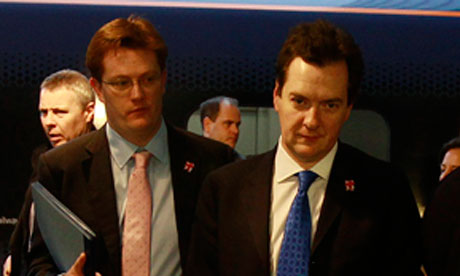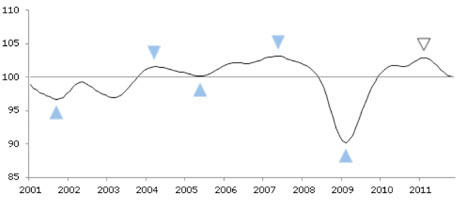That's all folks. Here's an evening summary:
• George Osborne has predicted that the euro will survive the current crisis, if European leaders take tough decisions. The chancellor also warned that the crisis has damaged the whole world.
• The UK economy probably grew by just 0.1% in the last quarter. The National Institute for Economic and Social Research (NIESR) also estimated that Britain managed growth of just 1% in 2011.
• The European Central Bank and the Bank of England both left borrowing costs unchanged. Mario Draghi, ECB president, said that the Bank's cheap loans operation was helping to ease the crisis, and saw some signs of stabilisation in the troubled Eurozone economy.
• Greece is now locked in crucial talks with its creditors over its debt reduction plan. Insiders say the next two days will be crucial.
• Hungary moved closer to patching up its relations with the European Union. A senior minister explained that the Hungarian government was prepared to consider changing its controversial shake-up of the country's central bank.
Our lunchtime round-up is here.
Thanks for reading and for commenting (if you did - if you didn't, there's always tomorrow).
Goodnight!
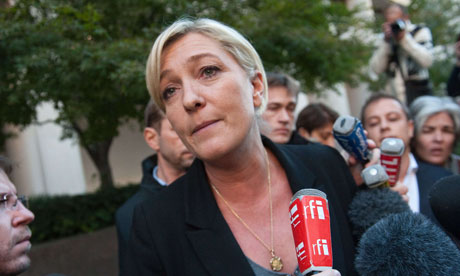 Marine Le Pen. Photograph: Nicholas Kamm/AFP/Getty Images
Marine Le Pen. Photograph: Nicholas Kamm/AFP/Getty Images
Over in Paris tonight, far-right leader Marine Le Pen has pledged to drag France out of the eurozone if she wins April's presidential election race.
Le Pen (daughter of you-know-who) claimed the move would help to balance the French budget, by sparing France the burden of supporting the likes of Greece.
Ms Le Pen is clearly an economic free thinker -- according to Reuters, she also proposes "taxing imports and tapping the [French] central bank for cheap loans instead of the debt markets."
The Institut Montaigne think tank reckons that French GDP would shrink by a fifth over a decade if it left the euro -- less attractive than Ms Le Pen's claim that it would raise €87bn.
With the National Front leader running third in the polls, we may never find out how her ideas work in practice.
On Wall Street, shares have closed a little higher for the fourth day in a row.
The Dow Jones industrial average finished 21 points higher at 12,471, while the S&P 500 posted a new five-month high (for the third day in a row).
Investors are really waiting for some major developments in the eurozone crisis*. Sandy Lincoln, chief market strategist at BMO Asset Management, told Marketwatch that:
The market is breathing really shallowly until it gets additional metrix, not only corporate results but guidance.
* - and we know how they feel.
Greece and its private-sector creditors are now involved in a race against time to finalise a debt writedown deal over the next 48 hours that will prevent the troubled country from defaulting on its massive debts.
My colleagues Helena Smith and Larry Elliott explain:
The body negotiating on behalf of investors is adopting a tough stance amid concerns that a breakdown in the talks would result in Greece failing to secure the next tranche of its bailout cash from the European Union, the European Central Bank and the International Monetary Fund.Charles Dallara, who heads the Washington-based International Institute of Finance, which is acting on behalf of private investors, said "some key areas remained unresolved" after a two-hour meeting with Greece's finance minister Evangelos Venizelos.
"Discussion will continue in Athens [on Friday] but time for reaching an agreement is running short," Dallara said in a statement.
"It is essential in order to finalise the voluntary agreement that support be given by all official parties in the days ahead."
More here.
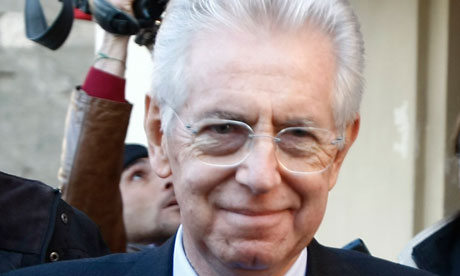 Italy's new leader Mario Monti. Photograph: Pier Paolo Cito/AP
Italy's new leader Mario Monti. Photograph: Pier Paolo Cito/AP
There are reports tonight that Italian taxi drivers are holding imprompru strike action - in protest at some of the economic reforms being brought in by Mario Monti.
Via Alberto Nardelli on Twitter:
@AlbertoNardelli: Taxi drivers in several Italian cities spontaneously striking (against liberalisations) this evening without prior warning.
A union official warned yesterday that drivers would withhold their labour in ptotest at Monti's plans -- which include increase the number of taxi licences.
As Reuters explained:
Licences are often passed down from father to son. In 2007 when the government last tried to do this, cab drivers blocked traffic in Rome for several days until the legislation was withdrawn.
Will Monti be made of sterner stuff? There have been protests against his technocratic government already -- including clashes between students and police in Milan last month. Capitulating to the taxi drivers would be a major embarrassment, though, and raise doubts over his ability to make more radical reforms.
Interesting news out of America tonight -- the White House is poised to ask Congress to raise the US debt ceiling by $1.2 trillion.
Spokesman Jay Carney reporters that president Barack Obama would put the request though in "days not weeks', adding "it's imminent".
The request is in line with the agreement that was painfully hammered out last summer. Congress is expected to give its approve - which would give Obama enough headroom to keep borrowing until after the presidential election.
ITV's Laura Kuenssberg also asked George Osborne this evening whether he knew anyone who had lost their job in the crisis. In response, the chancellor doesn't actually name anyone - but argues that many people are suffering, even cabinet ministers!
Here's the full exchange:
Laura Kuenssberg:
Do you understand what people are going through? Have you had to make any changes? Do you know anyone who has lost their job?
George Osborne:
"Of course, these are difficult times and myself like every government minister has taken a pay cut, frozen our pay for five years. I'm not going to pretend being a politician in the Cabinet is as tough as people who have lost their jobs and are looking for work at the moment but I can tell you I am spending every hour that I have trying to make sure that we are doing the right things in Britain, trying to deal with our debts and get our economy growing and I think we are getting those decisions right.People around the world are looking at Britain and say 'there's a country making the right decisions at the moment.' Jobs are being created. Businesses are growing and our exports to the rest of the world are increasing. Things are going right but you cannot solve the problems of the last ten years over night - it is taking time and I accept that is difficult for families."
George Osborne has predicted this evening that the euro will survive, but blamed the problems in the eurozone for some of Britain's economic woes.
In an interview with ITV News, Osborne argued that there was "a lot of commitment" in Europe to making the euro work. However...
There is no doubt that Europe needs to do more to help its economies grow and take some of the decisions that actually we've taken here in Britain to deal with our debts. We need our European partners to take those decisions as well.
The Eurozone has been very damaging for the whole of the world, not just Britain but decisions have been taken and things are a little better than they were.
Osborne also responded to today's warning from NIESR that the economy probably grew by just 0.1% in the fourth quarter of 2011.
We have official forecasts in Britain. They say Britain will not have a recession. I have made it clear that these very are difficult economic times. Certainly if the rest of Europe goes into a deep recession that will be a real challenge for us here in Britain.
Yes of course there are disappointing things happening when you see unemployment going up but we are doing everything we can to make sure that in Britain we are protected from these global storms and we are setting up for example enterprise zones and we are getting businesses to come to Britain to invest…and I think one thing you will see this year is a fall in prices, in the rate of inflation.
The whole interview will be on ITV News at 6.30pm, and again on News at 10.
Reuters is reporting tonight that Greece could clinch a debt-swap deal with its creditors by "the end of next week", in time to make a formal offer in early February.
That fits in with the upbeat comments we heard from Greek officials last night, when our Athens correspondent Helena Smith was told that negotiations over the Private Sector Involvement were going well.
However, this tweet from the Wall Street Journal's Matina Stevis suggests that the man representing the banks sees hurdles ahead:
The IIF's Charles Dallara is in Athens for PSI negotiations & has spoken to @WSJ, the word "concerned" comes up a lot.
The WSJ also has a great explainer on the PSI talks here.
Hungary has given its clearest sign yet that it will bow to pressure and ditch its controversial legislation concerning its central bank.
Foreign minister Janos Martonyi declared this afternoon that Hungary was prepared to negotiate with the EU over the laws, which appear to undermine the independence of its central bank, rather than be summoned to the European Court of Justice.
Martonyi told Reuters that:
We want to find a solution for the complete, full independence of the national bank.
The comments come a day after the European Commission threatened Hungary with legal action, and just a few hours after ECB president Mario Draghi said he was "very concerned" about the situation in Hungary.
If Hungary is able to rebuild bridges with the EU, it stands a much better change of agreeing a second bailout from the International Monetary Fund.
A quick stock markets update, as European trading has just ended for the day.
The FTSE 100 fell 8 points to 5662.
The German DAX rose 26 points to 6178
The French CAC fell 2 points to 3202.
The FTSE's performance would have been better if Tesco shares hadn't plunged by almost 16%, after it reported disappointing trading figures today.
Royal Bank of Scotland was the biggest riser (up 5.5%) - as the financial sector enjoyed a good day.
David Jones, chief market strategist at IG Index, explained that:
Successful Italian and Spanish bond auctions lifted the mood and the banking sector.
Labour have responded to this afternoon's prediction that the UK economy grew by a meagre 0.1% in the last quarter.
Chris Leslie, Labour's Shadow Treasury Minister, said:
Chris Leslie MP.
If this estimate comes true it will be a very disappointing figure.
Our recovery was choked off well before the recent eurozone crisis, but if the Government refuses to take urgent action to get our economy moving again, then I fear this stagnant growth is set to continue into 2012.
This is bad news for families, businesses and for the deficit too.
The UK deficit has been much discussed this week, after Ed Miliband argued that Labour didn't ruin the UK finances -- because Britain only ran a deficit of around 2% of GDP in the good years.
Critics, though, would argue that the UK budget should have been in surplus pre-2007.
Our own Larry Elliott argued on Monday that Miliband wasn't telling the whole story.
Elsewhere, Lib-Dem blogger Daniel Furr has argued that Britain should bring in "balance budget" legislation to prevent chancellors running excessive deficits, along with a debt ceiling to keep the national debt in check (see Blue Liberalism: Fiscal Discipline Part One)
The counter-argument, being pushed by several Labour activists, is that it is vital to take a more relaxed approach to the deficit in the short term, to deliver the growth needed to bring down borrowing levels in future years.
As Leslie said this afternoon:
To successfully get the deficit down we also need to get our economy moving again, get people off benefits and into work and build a better economy for the future.
If you're intererest in this issue, this piece from last month by TUC senior policy officer Duncan Weldon is still well worth a read.
Mario Draghi has also added a new word to the eurocrisis lexicon -- technostructure.
The ECB president used the term to underline his support for the European Financial Stability Fund, telling reporters that:
We are willing to put all our technostructure at the disposal of the EFSF.
But what does 'technostructure' mean, Anyway? JK Galbraith is credited with coining the expression in the 1960s, in The New Industrial State, to describe the companies that control the bulk of economic output in the industrial sector.
In this case Draghi would seem to be signalling his full support for the EFSF, but underlining that he will not invade its remit (ie, the EFSF's role is to finance eurozone countries who have accepted help from the IMF, while the ECB is still focusing on price stability).
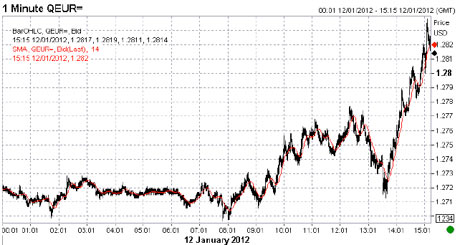 Data: Reuters
Data: Reuters
Mario Draghi has sent the euro rallying this afternoon, following his comments that the ECB's cheap loan programme was working.
The euro traded as high as $1.2838 in the last few minutes.
Looking at City reaction, two different economists said that the ECB president had 'taken a breather' after a hectic start to his term. It probably won't last, though.
Carsten Brzeski of ING commented:
High inflation and tentative signs of a stopping of the growth deterioration have motivated the ECB's current wait-and-see stance. As soon as the Eurozone economy slips further, a next rate cut looks highly probable.
And Howard Archer of IHS Global Insight said:
The general impression coming from the ECB is that is now very much in "wait and see" mode regarding any further interest rate cuts.
The ECB seems to leaving the door very much open to further interest rate cuts.
Afternoon all. Some breaking news on the UK economic front -- British economic growth halved last year and ground to a virtual halt in the final quarter of 2011.
The data from the National Institute for Economic and Social Research (NIESR) will reinforce fears that the country is slipping into recession:
NIESR estimated that GDP grew by just 0.1% in the three months ending in December. That implies the economy grew by just 1% in 2011, less than half the 2.1% in 2010, the thinktank added.
As Katie Allen points out:
Official figures on fourth quarter growth are due on 25 January and many economists predict they could show no growth at all or even a slight contraction.
NIESR's estimates follow news this morning that industrial output slumped in November, denting government hopes that manufacturers and other parts of industry will help offset weak consumer demand and government cutbacks.
The Bank of England today held off expanding its programme of pumping more electronic money into the economy - known as quantitative easing (QE) - and left interest rates at a record low of 0.5%, as forecast. But it is widely expected to resume its QE programme soon to help shore up a flagging UK economy which faces pressures from austerity measures at home and a sovereign debt crisis in the eurozone.
Paul Dales, senior US economist at Capital Economics says US retailers did not have a happy Christmas and he sends us this comment on the news retail sales rose just 0.1% in December.
The 0.1% m/m increase in retail sales was the smallest December gain since sales fell by 2.6% m/m at the height of the recession in 2008. Moreover, once sales of gasoline, autos and building materials are excluded, sales fell by 0.1% m/m. This is in stark contrast to the average 0.5% m/m rise in this measure of underlying sales seen in the five months to October.In other words, households have started to pare back their spending, most probably because their real incomes have continued to fall. Almost all sales categories performed poorly.
...
It may still be the case that in the fourth quarter as a whole real consumption rose at an annualised rate of at least 2.0%, which would be up from 1.7% in the third. Fourth-quarter GDP growth should still have been close to 2.5%. With spending having slowed towards the end of the year, however, the omens for 2012 are not great.
Now to Wall Street for a quick look at the market open before I hand over to my colleague Graeme Wearden.
The Dow Jones Industrial Average opened just inside positive territory but has now dipped into the red, down 15 points, or 0.1%, at 12434.
The choppy start follows data before the open showing US retail sales rose at their slowest pace in seven months in December while first-time claims for jobless benefits moved higher last week.
Total retail sales increased 0.1% after rising 0.4% in November, the Commerce Department said. That compared with a forecast rise of 0.3% in a Reuters poll of economists.
Draghi's ECB press conference has now ended.
To sum up very quickly, he noted substantial risks to the economic outlook, said the ECB stood ready to act on interest rates as needed, that cheap three-year loans offered in December were being effective and he sought to rebuff reports European banks are merely parking the funds back with the central bank.
He also demanded focus on sticking to deficit reduction programmes from governments but said job creation must also be a key objective.
He said the latest decision to leave rates at 1% was unanimous.
On Greece, he said the country "has to move forward on the fiscal consolidation front" but he had no news on Greek talks with private investors "that I can comment on".
In his opening statement, he also noted "tentative signs of a stabilisation in activity at low levels."
Now to Draghi's expectations for its next scheduled move to pump cheap loans into the eurozone banking system.
After strong take-up for the ECB's low interest three-year loans in December there will be another offer in February. Referring to this operation - already known about - Draghi says he expects "substantial demand" for the loans.
So after demanding governments pursue deficit reduction as agreed and "rigourously", Draghi also says job ceration must be a primary objective in the economic policies of eurozone countries.
He stresses, however, that job creation is "A" primary objective and not "THE" primary objective and it has to go hand in hand with deficit reduction and that job creation should come "through structural reforms".
Draghi's news conference following the ECB's decision to leave interest rates at 1% continues.
Asked about the outlook for borrowing costs in the eurozone, he says the central bank's monetary stance will remain accomodative. Moreover, asked if rates will stay on hold next month, Draghi says the ECB stands ready to act if needed. That chimes with the forecasts of many economists who see rates falling further in coming months.
Asked a question by a reporter from his native Italy, Draghi says he has no comment on Italian leader Mario Monti's call for the ECB to be relaxed.
Turning from Italy to Hungary, he says "we are really very concerned" about issues there.

Answering questions about Greece, Draghi says "Greece has to move forward on the fiscal consolidation front".
He says he has no news on Greek talks with private investors "that I can comment on".
In his opening remarks he also said:
Concerning the involvement of the private sector in financial assistance for indebted countries, we welcome the reaffirmation that the decisions taken on 21 July and 26 and 27 October 2011 concerning Greek debt are unique and exceptional.
Draghi's opening statement is now available on the ECB website. Here are his initial remarks:
The information that has become available since early December broadly confirms our previous assessment. Inflation is likely to stay above 2% for several months to come, before declining to below 2%. At the same time, the underlying pace of monetary expansion remains moderate. As expected, ongoing financial market tensions continue to dampen economic activity in the euro area, while, according to some recent survey indicators, there are tentative signs of a stabilisation in activity at low levels.
The economic outlook remains subject to high uncertainty and substantial downside risks. In such an environment, cost, wage and price pressures in the euro area should remain modest and inflation rates should develop in line with price stability over the policy-relevant horizon.
...
The provision of liquidity and the allotment modes for refinancing operations will continue to support euro area banks, and thus the financing of the real economy. The extensive recourse to the first three-year refinancing operation indicates that our non-standard policy measures are providing a substantial contribution to improving the funding situation of banks, thereby supporting financing conditions and confidence. In addition, we are actively working towards the implementation of all the measures announced at our December meeting, which should provide additional support to the economy. As stated on previous occasions, all the non-standard monetary policy measures are temporary in nature.
Draghi has now turned to defending the effectiveness of the ECB's landmark three-year loans, half a trillion euros of which were offered to eurozone lenders in December.
He says he is seeing more signs the operation was successful as time passes and that it prevented would could have been major constraints on lending.
As for reports that banks are merely parking the money back with the ECB, Draghi also seeks to set the record straight on how to interpret the ECB's balance sheet. He says that by and large the banks that have taken three-year loans are not the same ones as those depositing at the ECB. He also stresses that the liabilities side of the ECB's balance sheet has to go up when it issues loans.
Draghi is now taking questions from the media. In answer to the first question he says today's interest rate decision - rates were left at 1% - was unanimous.
On the downside risks to growth, which Draghi characterises as "substantial", he says they stem primarily from the debt crisis, weaker than expected global growth and protectionism.
Turning to banks, he demands that moves to improve their finances do not hurt lending to the economy.
On governments, Draghi asks they stick to "correcting excessive deficits in accordance with agreed timetables" and do so "rigourously" to bolster confidence across the eurozone.
Katie Allen here taking over from Rupert Neate for a short while to bring you highlights of Mario Draghi's ECB press conference.
Draghi has started off by flagging up substantial downside risks to the economic outlook for the eurozone and high uncertainty around the outlook. He says that inflation will stay above 2% for several months before declining. He adds that ongoing financial market tensions contune to dampen economic acttivity in the euro area although he does note "tentative signs" of stabilisation in activity at low levels.
He says the central bank expects the euro area economy to recover, albeit very gradually, in the course of this year.
As for the ECB's support for the economy, he stresses all non-standard ECB measures are temporary.
Time for a lunchtime round up:
• Both the ECB and Bank of England kept interest rates on hold
• Spanish and Italian bond yields fell
• UK industrial output fell in November
• The OECD warned of slowing growth in most of the industrialised world
Katie Allen is talking the helm now to guide you through Draghi's press conference.
My colleague Jill Treanor has sported a potentially worrying announcement from Clydesdale Bank.
Clydesdale, which has 347 branches across the UK, shows that its parent, National Australia Bank has pumped another £400 m (approximately A$600 million) into the operation. The last reported tier 1 capital ratio - the key measure regulators use to measure financial strength - was 9.8%. Clydesdale said the extra capital raised its ratios by 1.4 percentage points and it does not
appear to have been forced upon the bank by any regulators. David Thorburn, chief executive of Clydesdale and Yorkshire, said: "This capital increase continues our focus on maintaining a conservative level of liquidity and strong capital ratios."
Gold is climbing towards $1,660 an ounce after the ECB hedl rates and the well-received Spanish and Italian bond auction.
Spot gold was up 1% at $1,656.89 an ounce at 12:51pm, having earlier touched a one-month high at $1,657.60. U.S. gold futures for February delivery were up $18.00 an ounce at $1,657.60.
LGT Capital Management analyst Bayram Dincer said gold prices woudl be boosted further if ECB president Draghi gives a "slightly more dovish statement regarding long-term operation rates and bond buying, new liquidity measures" at 1.30pm
European Commission President Jose Manuel Barroso has said the European Union executive will use its authority to ensure Hungary complies with the bloc's laws.
It comes after Hungary brought in new rules that limit the independence of the county's central bank.
We will use all our powers to make sure Hungary complies with the principle and values of the EU. I'm confident we will achieve that.
Alex Lawson, financial risk manager at Moneycorp, said:
Today's decision took few by surprise as February's meeting looks the more likely date for any expansion to the quantitative easing programme. By that time, the Bank will have seen the latest quarterly forecast for inflation and the first estimate of the pace of economic growth in the fourth quarter of 2011, allowing them to make a more informed decision. An expansion to QE has probably already been largely priced into the pound which may limit the effect of any announcement next month; in the meantime, sterling is likely to make further tests of support at $1.5270 against the US dollar and consolidate recent gains versus the euro while the markets wait for economic data to give them direction.
The ECB has kept rates unchanged at 1%.
Mario Draghi, ECB President, will provide more details and explain the governing council's decision at 1:30pm. Until then, there's an extensive press release on the ECB's website.
No change. The Bank of England has held interest rates at the record-low of 0.5% and QE at £275m.
Ian McCafferty, chief economic adviser to the CBI, said:
Today's decision by the MPC to leave monetary policy unchanged was expected, since the current round of asset purchases is not yet complete.
"But with economic conditions fragile and inflation expected to undershoot, the MPC appears to be signalling that a further extension of the asset purchase programme is likely in the months ahead.
You couldn't make it up. The next EU27 heads of state government meeting to discuss measures to promote growth and employment has had to be rescheduled because... of (another) general strike in Brussels.
It will now be held on Sunday 29 Jan, rather than Monday 30.
(thanks to Citi for the heads up)
Another recession alert. The OECD has warned that it expects growth to slow in most of the industrialised world.
It said its monthly indicator pointed to more slowing in the OECD area, the 17-nation euro area and the top five Asian economies as a whole, although it showed hints of a turn for the better in Japan, the United States and Russia.
The OECD's leading indicator for the UK fell for a 9th successive month.
Within the euro zone, where the index dipped to 98.3 from 98.7, one of the more significant drops was in Germany, down 0.8 points at 97.9, slipping further from the long-term average.
China dipped 0.1 points to 100.0, while an Asian aggregate grouping the five economies of China, India, Indonesia, Japan and South Korea dipped 0.2 points to 98.9.
Howard Archer, chief UK & European economist, said:
Slowdown in the OECD area. Source: OECD
A further drop in the OECD leading indictor for the UK in November maintains serious concerns that the economy is headed back into recession. The only crumb of comfort from the OECD indicator was that the rate of decline moderated in November to the slowest level since May. In our recently completed January forecast, we projected UK GDP growth to be limited to just 0.3% in 2012 following estimated expansion of 0.9% in 2011. We believe that the economy was essentially flat in the fourth quarter of 2011 and suspect that it will contract modestly in the early months of 2012. We expect the economy to stabilize towards midyear and then see gradual growth getting underway from the third quarter. The situation in the Eurozone continues to post serious downside risks to this forecast.
Following the success of Spain and Italy's bond auction, Ireland (which has been shut out of the international markets since accepting a IMF/EU bailout in 2010) is hoping to make a "tentative return" to the bond markets some time next year, its PM Edna Kenny said in London.
Buona notizia. Italy got its bonds away at half the interest rate it was paying last year.
The yield on Italian 12-month bills fell to 2.735%, from the near-6% yield Italy paid to sell one-year paper at a mid-December auction. It's the lowest since June 2011.
Italy sold €8.5bn of 12-month BOT bills and €3.5bn of bills maturing at the end of May. The 12-month sale was covered 1.5 times, versus a bid-to-cover ratio of 1.9 at the slightly smaller sale in mid-December.
The 10-year yield spread between Italian and German bonds fell below 500 basis points for the first time this year.
Tesco's share price has now dropped 14.4%, and dragged Morrison down 7% and Sainsbury 4.4%).
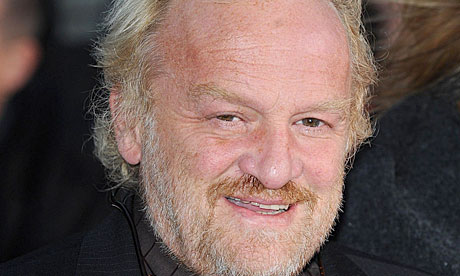 Antony Worrall Thompson was reportedly spotted shoplifting on five occasions in just over two weeks. Photograph: Ian West/PA
Antony Worrall Thompson was reportedly spotted shoplifting on five occasions in just over two weeks. Photograph: Ian West/PA
Read Nils Pratley on Tesco's troubles.
In the style of a celebrity shoplifter, Tesco's management confessed this morning to "long-standing issues". Philip Clarke, new-boy chief executive, let it all spill out. "We've driven productivity a bit too hard. We've run hot too long," he said. On fresh food, "we've been chasing our tail." He wouldn't want to describe big out-of-town hypermarkets as "a white elephant" but they are a "less potent force" and "we wouldn't want a great many more of them."
Meanwhile RBS is the biggest riser (+7%) after axing 3,500 jobs in its investment banking arm.
Results from Spain's bond auctions are in. The government managed to get the sales away at lower yields than last time (better value-for-money for the taxpayer). The average yield on April 2016 was 3.748% down significantly from 4.971% last time in July 2011.
Overall it raised €10bn form the auction of three bonds.
Philip Shaw, Investec's chief economist, on UK production numbers:
The manufacturing numbers aren't far from expectations, but what may be interesting is the continued weakness in industrial production. With services seemingly having got off to a very poor start in Q4, today's release heightens the risk that the UK economy contracted in the final quarter of the year.We've been suggesting that the UK will be in recession at the start of this year, but it may have started even earlier.
A relatively mild couple of months has resulted in softer utilities output. It's also true that there's a chunky fall in oil and gas extraction, and you could say those elements are unrelated to the state of fundamental demand in the economy.
Nonetheless, there isn't very much that's performing well in the UK economy.
British industrial output posted a surprise 0.6% fall in November raising the prospect that the overall economy contracted in the final quarter of 2011.
The 0.6% fall reported by the Office for National Statistics (ONS) comes against analysts' forecasts for an unchanged reading. Year-on-year it's down 3.1%.
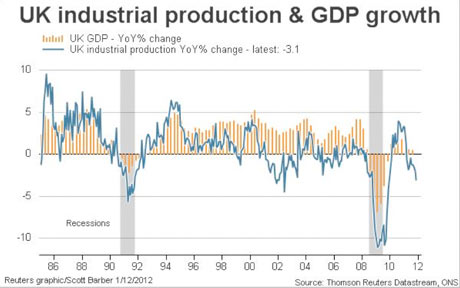 UK industrial production and GDP growth. Source: Thomson reuters
UK industrial production and GDP growth. Source: Thomson reuters
The ONS said the fall was driven by a decline in oil and gas extraction, and lower electricity production caused by unusually warm weather in November.
UK manufacturing production was down 0.2% month-on-month, 0.6% year-on-year.
Italy's PM Mario Monti has said he hopes for swift agreement on a European Union treaty to tighten budget controls so that the bloc can focus its energy on measures to stimulate economic growth.
Europe is not only about budget discipline. It is very important to move beyond this and to invest constructive political energy in growth.
We have to exploit the full potential of an integrated continent to grow more. And this has not been done up until now. It has not been done by the European institutions or by the biggest member states.
Italy, which has debt in excess of 110% of GDP at unaffordable interest rates, has been lobbying against tougher treatment of heavily indebted countries.
Monti also said the ECB may become "more relaxed" after a deal is reached on the fiscal pact.
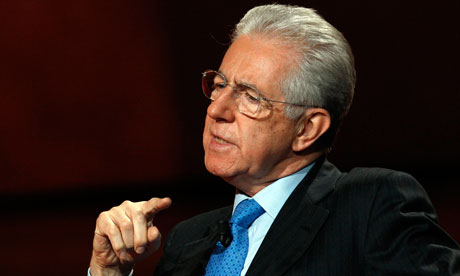 Mario Monti, Italy's prime minister
Mario Monti, Italy's prime minister
We'll see the results of Italy's latest bond auction at 10am.
Sterling has hit a three-month low against the dollar as investor fret about UK industrial output data due out at 9:28am.
Sterling fell to a low of $1.5279, very close to the 2011 low of $1.5270, below which would mark its lowest since late July 2010. Traders cited selling by a UK clearer and said the pound extended falls after dropping below stop loss orders around $1.5300.
"Sterling had been performing fairly well recently and it has come off, which is likely to reflect position adjustment ahead of today's central bank meetings," said Geraldine Concagh, economist at AIB Group Treasury in Dublin. "But the trend is still lower for euro/sterling and any upward momentum is likely to be sold into."
The pound also fell against the euro as the single currency benefited from investors trimming hefty short positions. However, the euro remained vulnerable, with sterling staying not far from a 16-month high.
The euro was up 0.3% against the pound at 83.15p, pulling away from its recent low of 82.22p.
Inflation in Germany jumped 2.3% over 2011 - its highest for three years and above ECB targets, according to the latest official data.
Soaring energy prices account for much of the rise in consumer prices index for the eurozone's largest economy. The 2.3% rise compares to a 1.1% increase in 2010 and 0.4% in 2009.
The ECB aims to keep inflation in the 17-nation euro area below 2%. But inflation in Germany exceeded that level in every month last year, the national statistics office Destatis said.
The ECB says whopping €470bn was deposited with them overnight as banks favour using the ECB as a safe haven for excess cash (even though rates are very low) rather than lend it out to other banks.
Overnight deposits have been at unusually high since August 2011, and hit several record highs in recent weeks.
€3.2bn was borrowed from the ECB overnight.
Could Tesco's disastrous results herald the beginning of the end of the hanger-sized out-of-town superstore? Very possibly, according to Tesco bosses, who on a call with analysts, said "we wouldn't call them white elephants ... but I'm not sure we'd want too many more of them".
Meanwhile, the disaster on the British high street continued this morning with Tesco reporting its worst sales performance in decades. The shares are down a stonking 10% - wiping €3bn off its market value.
Tesco has delivers its worst Christmas sales performance in decades despite a high profile £500m price cuts campaign to attract shoppers back to its stores.
Its chief executive Philip Clarke admitted he was "disappointed" with the group's performance which is the weakest of the four major supermarket chains over the important trading period. Analysts had predicted a 0.8% drop in underlying sales for the six weeks to 7 January but like-for-like sales excluding VAT and petrol, dropped 2.3%."

James Hall, consumer affairs editor at the Telegraph, tweeted
Bad times at Tesco. Love it or hate it, but when that beast has falling sales you know the economy's dire.
Tesco's disaster has dragged down Morrisons (-5%), Sainsbury's (4.3%) and M&S (-2%).
There were also dire Christmas sales at Home Retail Group (owner of Argos and Homebase), Thorntons and Jeweller to the stars Theo Fennell warned that sales are tumbling and it's likely to make a full-year loss.
Here's today's agenda:
• 9:30am (all times GMT): A key Spanish bond auction. Spain is offering €4–5bn in 2015-16 bonds in its first auction of 2012.
• 10:00am: Italy, which needs to repay more than €50bn in bonds in the first quarter, will sell as much as €12bn bonds today and €4.75bn tomorrow.
• 12:00pm: The Bank of England's interest rate and quantative easing decision (rates are expected to be kept at their record low of 0.5% and QE is likely to be held at £275bn).
• 12:45pm: The European Central Bank (ECB) makes its decision on rates and QE (no change expected).
• 13:30pm Investors will get their first glimpse of the ECB's 2012 strategy as President Mario Draghi chairs a policy-setting meeting of the Governing Council.
• 13:30: US retail sales for December (which are expected to rise just 0.3%).
Here's a nice little primer for the day ahead courtesy of Michael Hewson at CMC Markets.
Throughout most of fourth quarter UK PMI data has always seemed to flatter to deceive when it comes to the UK manufacturing and industrial production data which has been less than convincing. This morning's release of November data is not expected to be any different with expectations fairly low on both the monthly and the annualised measures.Industrial production is expected to slip 2.2% annually, but improve from October's 0.7% slide to post a figure of -0.1%.
Manufacturing production is also expected to similarly improve on the monthly measure from -0.7% in October to -0.2%, while the annualised measure is expected to slide from positive to negative territory of -0.5%.
If the numbers are even worse than predicted it will certainly increase the pressure on the Bank of England to look at further easing measures in the coming months.
Today's rate decision will probably be too soon for the MPC to consider such measures in the short term, given recent comments from various policymakers about not wanting to pre-commit to further easing in light of the uncertainty in Europe.The likely outcome will be a "hold" on rates and a "hold" on the current £275bn of asset purchases.
Good morning and welcome back to another day of rolling coverage of the European debt crisis. We're expecting quite an action-packed day with bond auctions in Spain and Italy and interest rate and QE decisions from the Bank of England and the ECB (no change expected). There's also a slew of UK, European and US manufacturing and sales data due out. Analysts expect UK industrial production to have slipped 2.2% in November compared to a year earlier.
On top of that there's renewed concern that Hungary's problems may have spread to neighbouring Slovenia.

